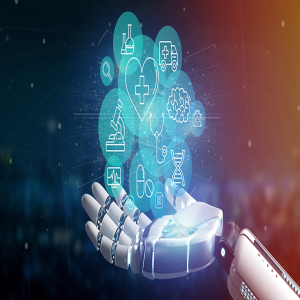Edge AI in Powering Smart Hospitals

The transition from computers to the cloud to the edge has shown to be highly beneficial to the healthcare industry. Many hospitals and pharmaceutical industries have begun to use edge AI. Despite the fact that the technology is not new, research indicates that there will be several ways for the healthcare sector to implement edge IoT and Edge AI into their everyday operations in the next few years.
Smart Hospital
The adoption of edge computing and artificial intelligence in the medicine domain would help aid and promote patient care while enhancing operational efficiency. Edge AI apps help with better data security which is necessary for hospitals to function better. Medical industries can adopt Edge AI for performing tasks such as:
- High precision thermal screening
- Inventory management
- Remote monitoring of patients
- Prediction of ailments
The promise of Edge AI in the Healthcare
Artificial intelligence lays the foundation for making smart hospitals a reality. With smart sensors such as AI-enabled cameras and microphones, physicians can improve patient care, increase data security, and advance operational efficiency. AI-powered tools and applications help healthcare facilities strengthen communication, streamline clinical workflows, and create a seamless patient experience.
Autonomous Monitoring of Hospital Rooms
AI algorithms can collect data using a whole host of sensors and analyze it to respond most appropriately. Edge AI takes this up a notch. Using computer vision, data from other sensors enables autonomous monitoring of hospital rooms and patients. Take for instance, fall detection. Many wearables these days come with the ability to detect if a person falls suddenly using specific hardware.
One example of this is the fall detection feature on Apple Watch. Another area where Edge AI can be of immense help is the monitoring of vital signs. Medical devices designed to record data like heart rate, temperature, respiration rate; blood pressure, etc. can leverage AI to detect any abnormality in an instant. The devices could then notify the hospital staff and they can take it from there. For the patient, this is not only critical but also improves the overall experience.
Patient Monitoring
Edge AI applications in the healthcare (patient monitoring) sector provide several distinct advantages when compared to a traditional cloud-based system. Generally, in hospitals, the monitoring of devices like glucose monitors, cardiac trackers, blood pressure sensors, etc. are either not connected, or where they are, large amounts of unprocessed data from devices need to be stored in a cloud environment or on multiple servers. An Edge AI application allows the healthcare provider to process all patient monitoring device data locally. Edge AI also enables real-time analytics to record patient behaviours and view patient dashboards for full visibility.
Some realtime systems that uses Edge AI in healthcare are as follows:
Clara Guardian
The need for smart hospitals has never been more urgent. Smart sensors can act as “eyes and ears,” ensuring safety and operational excellence in critical ways—from temperature screening and protective gear detection to safe social distancing. NVIDIA Clara Guardian is an application framework and a partner ecosystem that brings smart sensors and multimodal AI together to improve patient care in healthcare facilities.
Clara Guardian, a smart hospital edge AI system that uses sensors to limit the spread of infectious disease and deliver things like operating room analytics and workflow automation. Clara Guardian and partners like AnyVision and Care.ai are currently deployed in 50 hospitals in countries like China, France, Italy, and Israel, covering 10,000 hospital rooms today.
Ouva AI – Contact-Free Hospital Interactions
Ouva is a hospital intelligence platform that monitors patient safety, acts as a patient assistant and provides a sensory experience in waiting areas — without the need for anyone to touch anything. The Ouva platform automates patient monitoring, which is critical during the pandemic. By detecting changes in patient movement and alerting workers of them in real-time, the Ouva platform allows nurses to pay attention to the right patient at the right time.
The platform minimizes the time that nurses may be in the dark about how a patient is doing. “This in turn reduces the need for patients to be transferred to the ICU due to situations that could’ve been prevented, like a fall or brain injury digression due to a seizure.” Ouva’s system also performs personal protective equipment checks and skin temperature screenings, as well as flags contaminated areas for cleaning, which can reduce a nurse’s hours and contact with patients.
Sources:
https://appinventiv.com/blog/what-is-edge-ai/
https://resources.nvidia.com/c/powering-smart-hospitals-sb?x=GKqImI&lx=KWlJE5
https://www.einfochips.com/blog/how-edge-ai-is-transforming-healthcare/
https://www.micro.ai/blog/edge-ai-what-is-it-and-how-does-it-work
https://blogs.nvidia.com/blog/2020/09/03/ouva-contact-free-hospitals/

